Vicente del Bosque: Worthy of legend status or just living off Luis Aragones’ work?
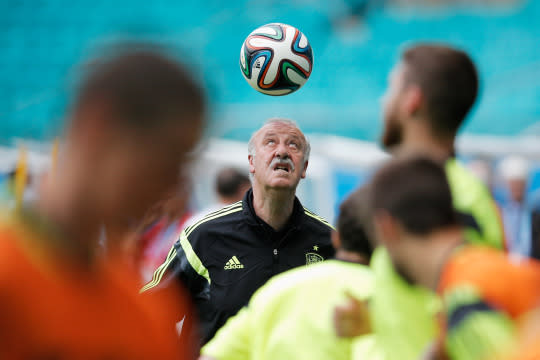
After three tournaments of unbridled joy for Spain as they triumphed in the European Championships twice with a World Cup victory sandwiched in between, they were brought back down to Earth with a bump in Brazil and failed to get out of the group stages. The winning run would have to stop at some point as they’d already made history by winning three international tournaments in a row but few predicted it to go as badly as it did in South America.
An opening 1-5 defeat at the hands of the Netherlands set the tone as del Bosque opted for Diego Costa, the man who Spain fought host nation Brazil to secure the services of, ahead of the mercurial David Villa up front. The long, drawn-out legal process to secure Costa’s place in Spain’s squad no doubt tied the coach’s hands when it came to selecting him but it was of great detriment to the side as they offered very little in the attacking third as Costa failed to gel with his teammates.

It was much of the same against Chile, a side they beat four years previous on their road to glory, as they were out-played for large sections of the game. Now no one is saying the Netherlands or Chile are bad teams or ‘banker’ victories by any stretch of the imagination, but against the South Americans they succumbed to a team who played their famous style better than them. Chile had evolved and improved since South Africa whereas Spain had stood still and were perhaps guilty of a little arrogance after being the kingpins of international football for so long.
Amongst certain high-profile personalities in the media, you simply aren’t allowed to criticise Vicente del Bosque. How can you besmirch a coach who had a decorated career at club level and has since won a World Cup and a European Championship with Spain? If you look beyond that, to moan about the team not being good enough is purely down to the fact we were ‘spoilt’ by an elite period of Spanish dominance and to expect the same now is pure ignorance. I’d argue ignoring the current failings – after the alarm bells that sounded in Brazil – is more evidence of ‘pure ignorance’ than anything else.
Let’s take a trip down memory lane and remember that Spain’s success didn’t start at the hands of del Bosque but rather those of Luis Aragones. Here was a coach, with a less than stellar record it has to be said, struggling to get the most out of a talented Spain squad. He had promised to walk away if he didn’t get Spain to at least the semi-finals of the 2006 World Cup. They went out at the Round of 16 stage but Aragones stayed on.
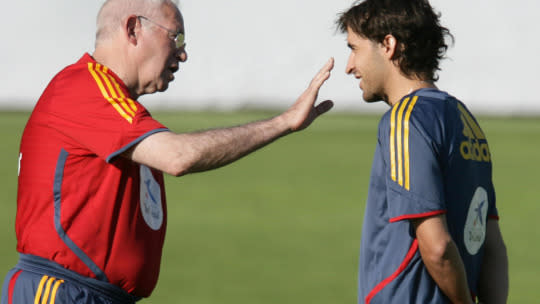
At that very tournament the team’s most recognised and popular player, Raul, was surrounded by rumours he’d created disharmony amongst the squad. It was seen as a gamble to even take the Real Madrid frontman after he’d picked up a knee injury but the media – and powerful figures in Spain’s FA – made it clear he should go. Raul, unhappy at the minutes he was getting out on the pitch, made the situation uncomfortable. Aragones didn’t feel he was ready to play 90 minutes whereas Raul felt he was good to go.
Perhaps believing he had nothing to lose, the coach decided not to pick Raul for his Euro 2008 squad. To say this started a shitstorm would be underplaying it as the media went ballistic at the omission of the country’s star striker and, let’s not forget, captain at the time. He hadn’t featured for Spain since 2006 but in Madrid, they championed for his inclusion after he’d scored 18 league goals – his best return for seven years. Aragones, to his credit, didn’t flinch.
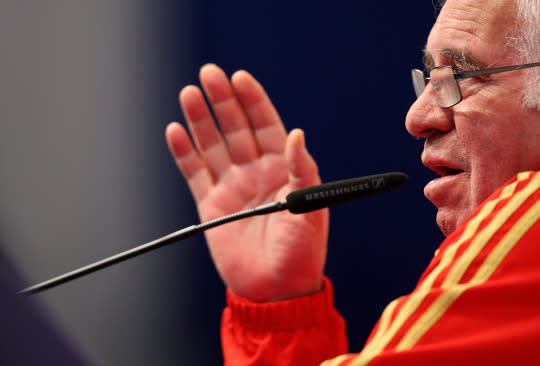
“I focus on the players, not the clubs. There are other players, who have scored more goals per minutes played (than Raul), and they aren’t coming either.” A defiant statement and a distinct middle finger to the sometimes toxic media over here. Daniel Guiza and Sergio Garcia were chosen alongside usual suspects David Villa and Fernando Torres to make up the attacking options for Spain.
It felt like a clean slate for the national side as the message was clear: if you perform well you’ll get a chance, regardless of who you play for. No one was bigger than the team and that mix of youth and experience worked wonders as possession football was coupled with attacking intent. Not exactly the suffocating version we saw at Barcelona during that time – and that’s not meant as a negative before the sensitive amongst you feel it is – but one which was comfortable on the ball as well as deadly on the break.
Aragones even managed to offset the loss of key defensive midfielder, David Albelda, by bringing in Marco Senna. The Villarreal midfielder turned out to be one of the stars of the tournament, taking full advantage of his opportunity. Albelda, a lynchpin in the qualifiers, had fallen out with then Valencia coach Ronald Koeman and found himself on the sidelines from January of that year.
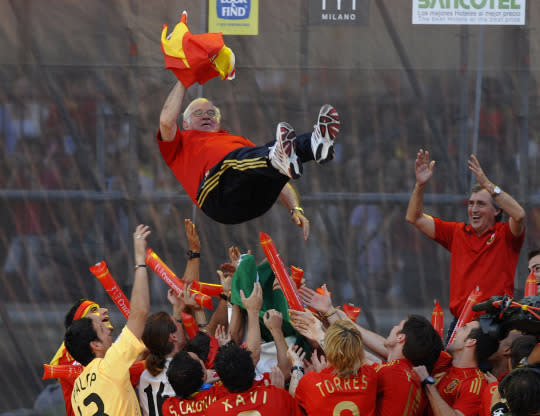
At the tournament itself star striker David Villa was injured early in the semi-final against Russia but his replacement, Dani Guiza, popped up with the second goal as Spain eventually ran out 3-0 victors. In the final Aragones switched tactics and abandoned his two-man forward line to incorporate a young Cesc Fabregas and asked him to play just behind Torres. It worked and Spain emerged as European Champions after beating Germany 1-0.
Sadly it all ended on a sour note as Aragones left his post as Spain manager after Euro 2008, as he felt the current board didn’t want him to carry on. “The (Spanish) Federation didn’t want me as coach. If they had wanted me (to stay), they wouldn’t have spoken to another while I was still working.”
As you would expect the Spanish FA denied the claims, stating it was Aragones himself who had made the decision to leave. “He told us and the sporting director Fernando Hierro he was going. We stood by him when the opinion polls were against him as we believed in him and his work.” A few days later del Bosque was confirmed as his successor.
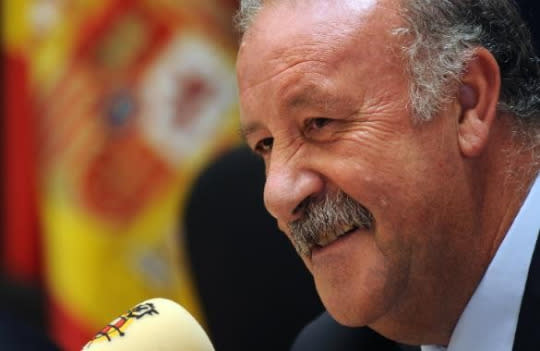
It was like being handed the Golden Ticket. The blueprint of the side was already in place and it was just a case of keeping it on track. Key Barcelona men Gerard Pique, Sergio Busquets and Pedro Rodriguez were added to the mix as well as Jesus Navas but the general look and style of the team remained the same. In South Africa they were even more dominant than in Germany, Andres Iniesta the hero with his last minute goal. The del Bosque era was off to a good start.
The first real test of his reign came as top scorer David Villa broke his leg and was ruled out of Euro 2012. The system didn’t work as well with Torres or Alvaro Negredo leading the line so Fabregas was asked to fill in as a false nine. Once again, del Bosque had found an answer and with Iniesta and David Silva either side of Cesc, the team continued to dominate possession as well as rack up the goals.
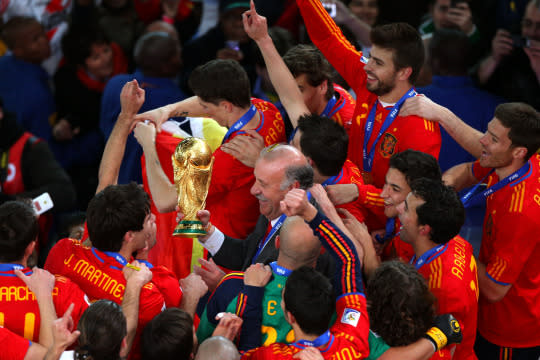
Sergio Ramos had moved to the centre of defence now with Alvaro Arbeloa taking over at right-back while the younger Jordi Alba, of Valencia but soon to be Barcelona, replaced Joan Capdevila at left-back. The team had a distinct dominance of Real Madrid and Barcelona players although admittedly it would be hard to select anyone else.
And then we’re back to the last World Cup showing. The manner in the defeats suggested an overhaul was needed, both in personnel and tactics. While the old guard had done a fantastic job, it was time to move on. Xavi Hernandez and Xabi Alonso bowed out of the international picture after the tournament while it appeared obvious del Bosque wasn’t going to count on David Villa any more either. But there was no need to worry as the U21, U19 and U17 sides had been ruling Europe at youth level too so it should be a smooth transition, right?

If del Bosque didn’t seem himself able to handle the transition he had the perfect opportunity to leave. He was held countable by most for the poor showing and his – or those above him’s – insistence on playing Costa instead of Villa. Despite all the talk of a change in management, del Bosque insisted he was the man to lead the next generation to glory at Euro 2016.
While the qualifying campaign hasn’t been bad, it’s hardly been thrilling either, plus there’s little sign of this progression into a new era. Iker Casillas, who no one is saying is a bad keeper, shouldn’t be heading into another tournament as Spain’s number one. David de Gea deserves an opportunity to establish himself whereas Sergio Rico’s fine form also warrants a few caps in friendly matches so he can build up an understanding with the defence.
Throughout the team there still remains a lot of question marks and no clear indication of what the long-term aims are. I expected to see the likes of Koke and Isco integrated into the first team picture but they are still behind an underperforming Fabregas in the pecking order. Juan Mata and Pedro haven’t worked for Spain in nearly three years but continue to take the place of higher quality and in-form players such as Nolito and Sergi Roberto.

It’s not all doom and gloom, however. Del Bosque deserves credit for putting faith in Thiago Alcantara who, bar injury, should get into Spain’s starting line-up in France. The rise of importance of Mikel San Jose is another plus as he looks the best option to cover both Busquets and the two central defenders should, god forbid, anything happen to them. It’s also refreshing to see Alvaro Morata, Paco Alcacer and particularly Aritz Aduriz in with a shout of making the Euros. Diego Costa’s shadow remains over all four and while he doesn’t deserve to start I think we all know he’ll go.
Right now del Bosque can’t really change anything too drastic. The moment to do that was straight after the disappointment of the World Cup but he bottled it, or didn’t feel the next generation were ready. I’d argue there exists a significant amount of favouritism when it comes to his squad picks as opposed to the ‘if you’re performing well, you’re in’ approach Aragones lived by. The likes of Nacho and Marc Bartra, with all due respect, have done nothing to warrant a place in Spain’s Euro 2016 squad.
The irony is despite all that I’ve said; Spain can still win the tournament. There isn’t a dominant side going into the competition which has been the case in previous years. Even though they lost to England, Germany are in with a chance as are France, who remind me a lot of the Spain side circa 2008. You might even consider England as dark horses if they can get their act together. Spain, for individual quality alone, are certainly contenders for the crown this summer too.
Luis Aragones responded to calls for him to leave by picking the squad he felt was best equipped to win the Euros regardless of who they played for or who sold the most shirts. Del Bosque has a chance of extending his legacy if he follows suit but another dismal display and all he’ll do is prove his critics right.
Is he capable of making the biggest calls and leading the team to glory, or will he be remembered for squeezing the most out of what Aragones left and failing to put the foundations in place for the future?

 Yahoo Sport
Yahoo Sport 






































